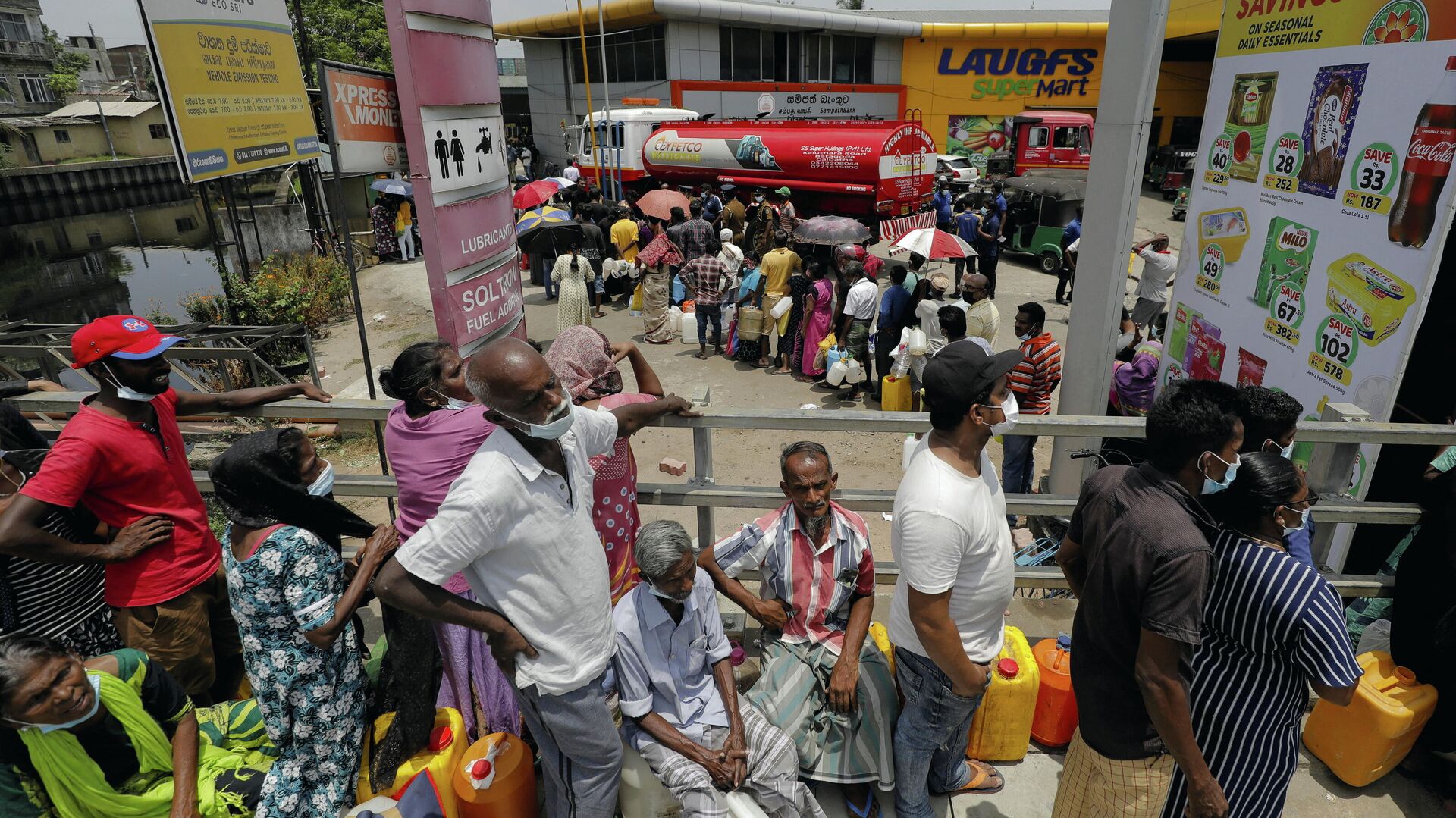https://sputnikglobe.com/20220323/sri-lanka-opposition-stages-massive-protests-against-crippling-economic-situation---video-1094124999.html
Sri Lanka Opposition Stages Massive Protests Against Crippling Economic Situation - Video
Sri Lanka Opposition Stages Massive Protests Against Crippling Economic Situation - Video
Sputnik International
Sri Lanka is facing one of the worst economic crises in decades. Food and fuel have become almost unaffordable, and in the absence of foreign exchange, the... 23.03.2022, Sputnik International
2022-03-23T18:19+0000
2022-03-23T18:19+0000
2023-03-05T10:45+0000
sri lanka
economic crisis
imf loan
gotabaya rajapaksa
china
foreign exchange
covid-19
financial aid
dollar
https://cdn1.img.sputnikglobe.com/img/07e6/03/17/1094127452_0:129:3187:1921_1920x0_80_0_0_64a5e7b8d4a92daffd520b66b399b986.jpg
On Wednesday, thousands of people who had been spurred on by Sri Lanka’s opposition parties took to the streets in the capital Colombo, protesting against the unprecedented financial crisis and a shortage of essentials.The protest organised by the Janatha Vimukthi Peramuna (JVP) party under the theme "End the 74-year curse. Join us to dismiss this tyrannical government" is one of the biggest protests against Gotabaya Rajapaksa's government since he won the 2019 presidential elections.The protesters are demanding that the government provide immediate relief from the unaffordable commodities prices. The long march was held a day after three people died while waiting in long queues in different parts of the island nation where there are desperate fuel shortages and rocketing prices.On Wednesday evening, President Rajapaksa held an all-party conference to find a solution to the economic crisis. During his address, he pointed out the need to "bring the economy to a stable position by embarking on short-term and long-term strategies".The central bank has also taken several steps in the past 24 hours to improve the foreign exchange situation that has affected payments for essential imports such as food, medicine, and fuel. Because of the payment crisis, the Rajapaksa government approached the International Monetary Fund (IMF) for a bail-out package.The COVID-19 pandemic strangled the island's economy as two significant sectors, tourism and remittances from working overseas, declined sharply.Last Thursday, India extended a $1 billion line of credit to the Indian Ocean island nation so that it could buy essential commodities.The Rajapaksa government has also gone cap in hand for a new loan and buyer's credit from China for $2.5 billion.China has provided a $5 billion loan to Sri Lanka, which was around 10 percent of the island's total external debt.
sri lanka
china
Sputnik International
feedback@sputniknews.com
+74956456601
MIA „Rosiya Segodnya“
2022
Rishikesh Kumar
https://cdn1.img.sputnikglobe.com/img/07e4/08/04/1080055820_0:0:388:389_100x100_80_0_0_40018ee210946d65d49ffba4f4c008e1.jpg
Rishikesh Kumar
https://cdn1.img.sputnikglobe.com/img/07e4/08/04/1080055820_0:0:388:389_100x100_80_0_0_40018ee210946d65d49ffba4f4c008e1.jpg
News
en_EN
Sputnik International
feedback@sputniknews.com
+74956456601
MIA „Rosiya Segodnya“
Sputnik International
feedback@sputniknews.com
+74956456601
MIA „Rosiya Segodnya“
Rishikesh Kumar
https://cdn1.img.sputnikglobe.com/img/07e4/08/04/1080055820_0:0:388:389_100x100_80_0_0_40018ee210946d65d49ffba4f4c008e1.jpg
sri lanka, economic crisis, imf loan, gotabaya rajapaksa, china, foreign exchange, covid-19, financial aid, dollar
sri lanka, economic crisis, imf loan, gotabaya rajapaksa, china, foreign exchange, covid-19, financial aid, dollar
Sri Lanka Opposition Stages Massive Protests Against Crippling Economic Situation - Video
18:19 GMT 23.03.2022 (Updated: 10:45 GMT 05.03.2023) Sri Lanka is facing one of the worst economic crises in decades. Food and fuel have become almost unaffordable, and in the absence of foreign exchange, the island nation is finding it difficult to import essential commodities.
On Wednesday, thousands of people who had been spurred on by Sri Lanka’s opposition parties took to the streets in the capital Colombo, protesting against the unprecedented financial crisis and a shortage of essentials.
The protest organised by the Janatha Vimukthi Peramuna (JVP) party under the theme "End the 74-year curse. Join us to dismiss this tyrannical government" is one of the biggest protests against
Gotabaya Rajapaksa's government since he won the 2019 presidential elections.
The protesters are demanding that the government provide immediate relief from the unaffordable commodities prices.
The long march was held a day after three people died while waiting in long queues in different parts of the island nation where there are desperate fuel shortages and rocketing prices.
On Wednesday evening, President Rajapaksa held an all-party conference to find a solution to the economic crisis. During his address, he pointed out the need to "bring the economy to a stable position by embarking on short-term and long-term strategies".
The central bank has also taken several steps in the past 24 hours to improve the foreign exchange situation that has affected payments for essential imports such as food, medicine, and fuel.
Because of the payment crisis, the Rajapaksa government approached the International Monetary Fund (IMF) for a bail-out package.
The
COVID-19 pandemic strangled the island's economy as two significant sectors, tourism and remittances from working overseas, declined sharply.
Last Thursday, India extended a $1 billion line of credit to the Indian Ocean island nation so that it could buy essential commodities.
The Rajapaksa government has also gone cap in hand for a new loan and buyer's credit from China for $2.5 billion.
"This is in addition to the $2.8 billion assistance China has already extended to Sri Lanka since the outbreak of the pandemic," Qi Zhenhong, Chinese Ambassador to Sri Lanka, said on Monday.
China has provided a $5 billion loan to Sri Lanka, which was around 10 percent of the island's total external debt.




